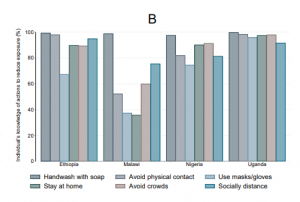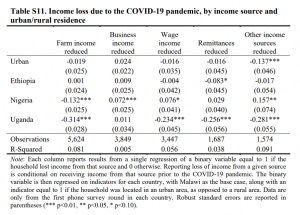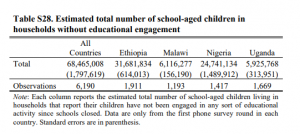By: Gerelyn Terzo
While Africa has managed to battle the COVID-19 pandemic better than much of the rest of the world, with fewer cases and deaths reported vs. Europe, Asia or the Americas, that does not mean it has emerged from the pandemic unscathed. And although countries like Nigeria have a path to green-light a COVID-19 vaccine in early 2021, the Sub-Saharan African region is still reeling from the impact of the virus.
Many African nations, including Nigeria, have suffered severe socioeconomic effects from COVID-19, ranging from a loss of income to a lack of access to medicine and staple foods. Nigeria, which boasts a population of more than 200 million, has experienced 71,000 infections and more than 1,000 deaths. As of December, however, a second wave has hit the country and the number of cases is once again on the rise. Comparatively speaking, COVID testing has been low at about 810,000 tests performed.
The World Bank Group published a report on these socioeconomic impacts of COVID-19 on Sub-Saharan Africa based on surveys from before and during the pandemic across Ethiopia, Malawi, Nigeria and Uganda.
The measures taken to stem the spread of the virus, including travel bans, lockdowns and closed businesses and schools, were necessary and indeed helped to limit the medical damage. However, there were also consequences of those actions, including the triggering of a global economic slowdown. Consequently, nearly 50 million more Africans could be on the brink of extreme poverty before the year is over, according to the report.
Greater Knowledge
Nigerians were first subjected to COVID-related lockdown measures on March 29. According to the World Bank’s survey results, the government has done a good job in delivering information about how Nigerians could take steps to slash the risk of getting the virus, and knowledge about the virus among the population is considered to be “very high.”
Nigerians largely took precautionary steps and made changes to their behavior in an attempt to mitigate the spread of the virus, including washing their hands with soap, staying at home, avoiding physical contact, avoiding crowds, and using masks and gloves and taking social distancing measures. According to the report, “in Ethiopia and Nigeria, at least 80% of individuals are familiar with five of the six measures,” as illustrated in the below chart.
Source: World Bank
Lost Income
As a result of the global lockdown measures, “hundreds of millions of individuals in low-income countries found themselves out of work, both in the formal and informal labor markets,” the report states. More than three-quarters of the populations of the four countries spotlighted in the report — Nigeria, Ethiopia, Malawi, and Uganda — are from households that have lost income as a direct consequence of the pandemic, according to World Bank estimates.
While there is no sharp contrast between rural and urban households, the study did find nuanced results by gender, where households led by females are “significantly more likely to lose income from remittances,” while for households led by men, the loss of income is more likely to stem from elsewhere, such as “investments, savings, pensions and government assistance”.
Source: World Bank
Some 25 million households across the four countries experienced a “virus-related shock to their income,” which represents roughly two-fifths of the households. Among them, Nigeria saw the worst of it in terms of numbers, with 15 million households suffering from a pandemic-fueled disturbance to their income.
Source: The World Bank
Food Security
Africa is no stranger to food shortages, with 670 million people, or 50% of the African population, suffering from food insecurity before the rise of the pandemic. Of those, 250 million people were considered “severely” food insecure, according to Brookings.
The trend has worsened as a result of the pandemic and the subsequent loss of income as a result of the lockdown measures. Moderate or severe food insecurity is a reality for nearly two-thirds of the adult population, or more than 100 million adults, across the four African countries highlighted.
Of the four countries, Nigeria suffers the most severe food insecurity, where more than three-quarters of adults, or 63 million, “are moderately or severely food insecure,” according to the report. This trend is more prevalent among female-led households vs. male-led households.
A lack of food security then leads to other concerns, such as worries about contracting COVID-19 or pandemic-related financial problems. The greater the food insecurity in a household, the greater the worries about health and financial status.
The loss of income has also had a domino effect on other areas of the household economy, including access to medicine. One-fifth of households polled were unable to access necessary medicines, and one-quarter of households were unable to afford staple food items. The households that were the worst off before the pandemic hit were less likely to be able to afford medicine, staple foods or soap vs. other families.
Student/Teacher Contact
Children in low to middle-income countries have lost an integral part of their education as a result of the pandemic — student/teacher contact. After bolstering school enrollment rates in these nations to more than 90% as of 2015, the numbers plummeted after the virus outbreak. The number of children engaging in learning activities dropped precipitously below 50%, based on World Bank estimates, with the rate of student/teacher contact hovering at 17%. Across the four countries surveyed, this results in 68 million children who should otherwise be in school lacking any educational engagement. There is a direct correlation between the poorest of households and a lack of access to education.
Source: World Bank
The wide-spread loss of access to educational contact will likely have a long-term impact on Sub-Saharan Africa. On the bright side, there are signs that households are accessing technologies including radios, TVs and mobile learning apps to stem the tide of educational losses. In fact, the number of households engaging with these technologies is on the rise, and countries including Nigeria are experiencing “significant increases in student contact with teachers,” the report states.
Double-Edged Sword
The World Bank hopes that its findings will help to steer the decisions by policymakers and international organizations alike on their attempts to lessen the impact of the pandemic as well as highlight the key areas that require further evaluation.
Gerelyn Terzo is a staff writer at Sharemoney, a money remittance service that is passionate about improving the lives of immigrants. The granddaughter of an Italian immigrant from the town of Teora whose first steps in the U.S. were on Ellis Island, Gerelyn resides in New Jersey.







